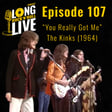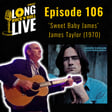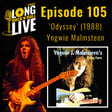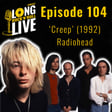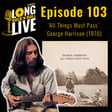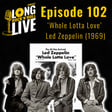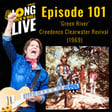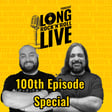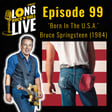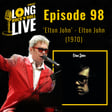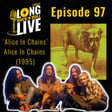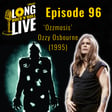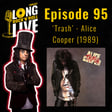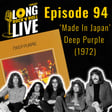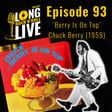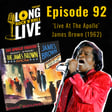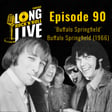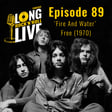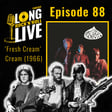Introduction and Special Episode Announcement
00:00:12
Speaker
Hello and welcome back to another long live rock and roll podcast episode with your host, Mr. Lazz Michael Eadie's here and on the screen over there, Mr. Felipe Amorim. How you doing, bro?
00:00:21
Speaker
Doing great. How's everyone doing? How are you doing, Lars? Oh, man, I'm excited because we're going to tell the guys what we've got going on today. So today. Special episode, isn't it? Special episode, our first interview.
Steve Rosen's New Book and Writing Process
00:00:32
Speaker
Today, we have the absolute pleasure of chatting with a renowned rock journalist who has finally released his long awaited book about the friendship he shared with the late iconic guitar player Edward Van Halen.
00:00:44
Speaker
That's right folks, the Eddie Van Halen. Now he was going to write Eddie's autobiography back in 1985 but the book never came to light and so Van Halen fans have literally been waiting for the best part of almost 40 years for this guy's book to come out. This writer has previously authored seven other books including biographies on Jeff Beck, Free, Bad Company, Black Sabbath, Randy Rhodes,
00:01:08
Speaker
and he writes about what being friends with one of the most iconic guitar players in the world in this new book.
Experiences with Eddie Van Halen
00:01:14
Speaker
In order to tell the story accurately, he poured over hours and hours of interviews and peered deep inside distant memories to create a book unlike any other out there. This journalist spent many hours with Eddie at his Hollywood house, up at Van Halen's 5150 studio, on airplanes, in cars, and even on several occasions with jamming with Eddie Van Halen.
00:01:35
Speaker
That's nuts, isn't it? I mean, this is crazy. The book is titled Tone Chaser, Understanding Edward, My 26 Year Journey with Edward Van Halen. And it chronicles his remarkable relationship with this rock icon. And so joining us now is legendary rock journalist, Mr. Steve Rosen. Let's get him in. Hello, Steve. How are you doing? I'm doing great. How's it going over there?
00:02:03
Speaker
Very well, thank you. Yes, welcome to the
Challenges of Writing About Eddie Van Halen
00:02:05
Speaker
show. I mean, we did chat earlier, but this is Felipe, our co-host, who you already know. Listeners, this is Steve Rosen, the author of the book. And we're absolutely thrilled to have you on, Steve. So thank you for joining us and coming to chat about your new book. Yeah, thanks a lot, Steve. We're glad to have you.
00:02:20
Speaker
You're welcome guys looking forward to it for sure. Excellent. So we've actually sort of, you know, we read, we both read the introduction and the epilogue. We both actually picked a few chapters to read. And we've kind of identified, you know, in our opinion, three categories about the book.
00:02:36
Speaker
or three things we want to talk about. So first of all, Steve, although the book is about the late grey Eddie Van Halen, there's an author behind the book, obviously, and that is you. So we want to talk about you for a bit. So the first thing that came through to me, Steve, was the absolute passion
00:02:52
Speaker
that you had for Van Halen, the man, the music. It was just obvious to see, you know, even from the bad times, you know, you were desperate to write the book and you were upset that the tapes were sitting there doing nothing. So you've interviewed and written about many musicians, I did allude to this in my introduction of you, many musicians and bands, but what is it you saw in Eddie Van Halen that made his life such a priority and focus for yourself?
Eddie Van Halen's Unique Influence on Music
00:03:20
Speaker
The lab, you're going to talk to me a hard ball here for the first one, huh? Yeah, that's it. We're going in straight, Steve. That's it. All right, for the jugular. Well, look, Matt, it took me 580 pages to try and answer that question. And hopefully I got close to it. You know, Matt, as you mentioned, look, I've
00:03:45
Speaker
I've been writing, as of today, I've been writing for about 50 years. I've met a lot of guitar players, you know, I've met some of the surely great guitar players of our time. Edward had this, I don't know, man, he had this extra XY chromosome that I never really felt with any other guitar players. Let me take that back.
00:04:15
Speaker
I felt it was Jeff Beck. Jeff Beck, and I write about it in the book, Jeff Beck was my favorite guitar player. And I think Jeff was just a rarity amongst rarities. But even amongst these other amazing guitar players I met, you could somehow understand them. You could relate to them.
00:04:42
Speaker
I don't know, man, he was wired differently. Everything he did, his pilly man, his ethic was just about making music. And if Ed could have gotten away without eating and sleeping, that's all he would have ever done.
First Meeting and Immediate Connection
00:05:00
Speaker
Being so close to that kind of creative, my God, goldmine, I mean,
00:05:09
Speaker
Again, I've been around these incredibly creative people, but to be around it sort of daily and to see it day in and day out and to watch the creative process or as much as I could be, you know, was it extraordinary? I mean, I knew, I mean, I could tell, look, I met him in 77 before the first album comes out. The first album comes out within, was it six or eight months? They're like selling more records than,
00:05:37
Speaker
Bernie and then he goes off and he does the day on the green and now he's out there with fans like Foreigner and ACDC. They're talking about a guy whose career just skyrocketed. And when he'd come off the road, I'd be around him and I could sense it, I could feel it. That this guy was something rare and I wanted to write about it. And I knew that there were going to be other journalists come scrambling after him.
00:06:03
Speaker
And there was no way I was going to let somebody else write this book. Look, Edward could have said to me when I asked him, no, man, I want Bill Smith to write. It's like, okay, Ed, if that's what you want, of course, you know. But I didn't think he was going to say that. I was hoping he wasn't going to say that. So I don't know, man, and to answer your question, there was just something. It was like being around, and I keep using this analogy. It must have been what it was like to,
00:06:33
Speaker
you know, if you were like an apprentice hanging around Da Vinci all day, or, you know, you were like some first year English student and you were watching John Steinbeck wrote, right, you know, of Mice and Men. I mean, it was check. My God, such an extraordinary thing. And you really felt that. And everybody else felt it too. You know, and ask somebody else, what was it that you loved about Van Halen? And they say, well, it's a smile and the music. Yes, we all know that.
00:07:02
Speaker
But it was that unseen thing, was that thing inside of him that just touched everybody. You know, and again, I tried to write about it.
00:07:10
Speaker
from many hundreds of pages, and I hope I got a little closer to what the truth was. Yeah, and undoubtedly, Steve, it comes across. Felipe, you had the next question, didn't you? Yeah, yeah. I wanted to tell us about the first and the last time you spoke to
Changes in Eddie Van Halen Over the Years
00:07:26
Speaker
him. So when you first met him and the last conversation you guys had, was he a different man? Because on chapter, I think, 61, you're talking about the phone call you had after seven years without talking to him.
00:07:40
Speaker
And it's when he actually uses the expression tone chaser, isn't it? Maybe for the only time he used it. And there's something really interesting that he says, which is, it says it's all about keep going. And it says, you know, I just keep going. Once you stop moving, that's the end of life. But he wasn't the same man you met in 77, was he? What was the difference between those two Eddie Van Halen's?
Continuing the Book After Eddie's Passing
00:08:10
Speaker
Right, man. So you bring up a very interesting point, Felipe. So the first time I meet Edward was an amazing night. So this is June or July of 77. I can't remember. I'm sorry. Deep Trick is recording a live record at the Whiskey.
00:08:34
Speaker
right, obviously not buddha Khan, next year they would record buddha Khan and blow up. But in 77, cheap trick was still playing the whiskey, you know, 200 seat club in Hollywood, you know. So I was there with my brother, Nick, and we were downstairs waiting for cheap trick to come on. And Michelle Meyer, who is the girl who booked it taps in on the shoulders is hey, there's somebody upstairs, you got to meet, you know, he's Godhead.
00:09:01
Speaker
When Michelle used the word Godhead to describe somebody, she was, yeah, for her that was the pinnacle of musicianship. That was somebody you had to meet. This was, you know, it didn't get any greater than that. And Michelle was really plugged in, man, to the whole musician community in Hollywood. She knew what was going on. As I mentioned, she booked a whiskey. She also booked a couple of pretty important punk clubs back in the day.
00:09:28
Speaker
Madam Wong's East and Madam Wong's West. I had a band, we weren't a punk band, but she booked us into both clubs and she never heard the band play just because she was a friend and maybe she liked what I did. For that reason alone, I owed Michelle and she said, there's a guitar player upstairs at the whiskey, I've got to meet. I was going to go meet this guitar player. We walk up the stairs to one of the whiskey dressing rooms, which is like,
00:09:59
Speaker
It's like the inside of a garbage truck. I mean, it smells of cigarette men. Such an iconic venue. Very iconic, man. You know, it's great, man, because really, I don't even know if the walls still exist, but the walls are covered in graffiti from all the bands who have played there. I mean, we're talking, you know, you know, you're going back to, you know, when bands like Zeppelin, and I know I'm veering off a little bit here, but the Whiskey's are really, it's a really important
00:10:28
Speaker
place for the Zoli Band and for Van Halen. So you go back to when Zeppelin first came over, I was at 68, maybe, nobody knew who Zeppelin was over here, and you played the whiskey.
00:10:47
Speaker
Alice Cooper and all these amazing bands played there. So they hit the doors, right? I heard butterfly. I mean, my God, the history. So yes, lots of history and lots of cigarette butts on the funky carpeting up on the dressing room. So we walk in and I see this guy standing there, you know, and again, this is 77. They've done no interviews. You really don't know what they look like. You've seen flyers.
00:11:17
Speaker
You know, because there was flyers all over other places about, you know, Van Halen playing. So I'm pretty sure I knew what he looked like, and I'm pretty certain I recognized him. But I wasn't sure. The other thing was I had never seen Van Halen play. I had never heard Edward Van Halen play. So I'm just meeting this dude, you know, that myself wants me to meet.
Tone Chaser's Unique Approach to Biography
00:11:41
Speaker
I did know that the band Van Halen had scored a big record deal on Warner Brothers Records. I did know that, so I'm thinking to myself, my God, the guy's got to be a very good guitar player at the very least. The band's got to be good to get a deal on Warners, right? Because no local band ever scored a deal. They were one of the first really stripped bands to score a deal and a major deal on a major label. So I go in, you know, and, you know, we shake hands and, you know,
00:12:10
Speaker
Eddie Van Halen, Steve Rosen, and Steve Rosen, Eddie Van Halen, Godhead, and Ed Smiles. Obviously, Edward had heard the phrase uttered by Michelle earlier. And you know, we just started talking. And I wish I could remember kind of how the conversation started. You know, that's a tough one. But I do remember
00:12:36
Speaker
I mean, what else are we going to talk about? Man, we talk about music. And I must have told him, yeah, man, I'm a music journalist or an interview band. I don't think that meant anything to him. Honestly, man, I could have been, and no offense to the janitorial staff of the whiskey, but I could have been the guy sweeping up as a whiskey. And I don't think it would have been the same difference to him. You know, I don't think he looked at me as a journalist as anything special or anything not special. Just that's what it was, you know.
00:13:04
Speaker
which is a pretty amazing quality about him, actually. So we start talking about guitar players, and she brings up, or maybe I brought up, because that would have been one of my yardsticks, would have been to bring up like Clapin, because I love Clapin, right? So we start talking about Clapin, and I realize just how much he loved Eric Clapin. And Richie Blackmore comes up, and Jeff Beck,
00:13:30
Speaker
There was a band called Detective, in fact, talking about Zeppelin. Detective was, I think, the first band signed to Zeppelin's own label, Swan Zone. And Michael Monarch was sort of a Jeff Beck clown. And I remember Ed saying, yeah, he's good, you know, but he's too much like Jeff Beck. And that was a pretty insightful thing because Monarch, Michael Monarch really wasn't that well-known at that time. And for Ed to have that insight into him
00:14:00
Speaker
And so recognizing Michael's playing that he really was doing the Jeff Beck thing, I thought, okay, this guy really knows, he really knows about music. Look, I was a little bit of an elitist, or maybe a lot of, I was a big elitist now, you know. So if I was talking to somebody, I was talking to you about Eric Clapton. And you said, yeah, well, Eric, you know, played really well on, you know, some cut.
00:14:26
Speaker
And if we all knew that cut sucked, and that was the worst of his playing, I'd go, Laz, I'm sorry, I can't talk to you anymore. Because you're not arriving to my level of understanding of who Eric Clapton is. You know what I mean, man? I mean, I'm being a little self
Capturing Eddie's Essence Through Twilight Tapes
00:14:40
Speaker
-deprecating here, but Edward didn't really know about Clapton's history. Look, he knew about Cream. He loved Cream. I'm sure he knew about Eric and the Yardbirds.
00:14:53
Speaker
You know, I don't know if he knew about Eric playing with Mayo, and I really doubt whether he knew about, you know, pre-Male, you know, Eric had like all those blues bands, the Roosters, and, you know, really fierce stuff. But what Ed did understand was Eric and Jeff and Richie as guitar players. And he would talk about Eric's vibrato, finger vibrato, you know, and the tone, and the marshals. I'm thinking, holy shit, this guy understands Eric in a way that,
00:15:23
Speaker
I couldn't understand. I was a guitar player, but not on that level. I, you know, and to have Ed, you know, explain his finger, my brother. So that first meeting was amazing. I don't know. We talked, I want to think it's 20 or 30 minutes. It could have been an hour, you know, just hanging out and, you know, he's smoking and he's smoking and he's smoking. And I would recognize that trait every single time I was with him.
00:15:50
Speaker
I thought it was horrific and horrible, but that's who he was, you know. So we get done talking, you know, and he kind of runs out of the room, you know, and I figured he was coming back. And he stood up, he comes back, you know, and he's got a pen in his hand, he picks up some scrap of paper off the whiskey floor, and he writes something, and he hands it to him, and it's his phone number. He goes, hey, man, you know, call me sometime, I'd like to talk to you again. I go, sure, man, that'd be great, you know. So it's like,
00:16:19
Speaker
Again, for all I knew, this was just a guitar player, again, in a band that had scored a deal on Warner Brothers. And to me, that was an amazing thing. But I didn't know how he played. I had no sense of who he was or who he would become, of course. So that meeting was amazing, man. And people asked the question, when do you think the friendship started? Was it like a year after you knew him? Honestly, if I really think about it,
00:16:48
Speaker
I think it began that night. I mean, he was comfortable around me. I was comfortable around him. I thought to myself, my gosh, here's a guy who knows all this shit about Clapton and Blackmore and, you know, he must be a good guitarist. Yeah, I'd love to talk to this guy again. So that's the first meeting. So going to the last meeting, Felipe and
00:17:13
Speaker
without giving the book away, you know, and I don't want to be like real secretive or, you know, but yes, you know, you mentioned that Edward changed. He changed, at least in my opinion, he changed dramatically.
00:17:33
Speaker
And he was going through things at the time. So 2003 is the last time I actually ever spoke to him. And you bring up that phone call. Yes, you know, I had spoken to him for seven years. Big, big change during that period. Yeah, and he brings up in the first time.
00:17:54
Speaker
You know, he described himself as a tone taser, which just blew me away. I mean, for him to describe himself like that, I thought, my God, that is so out of character for him, you know? And to use the word, and not that he's never used the word before, but, you know, yeah, man, it's that elusive thing. The Edward Van Halen I knew, man, didn't talk like that. He would have said,
00:18:18
Speaker
Yeah, man, you know, I'm fucking around with pedals and amps, and I'm looking for, you know, that new brown side. You know what I mean? It would have been more organic, but I thought, my God, that was so, I don't know, man, it was just so well-formed, you know? It just blew me away. And when it came time to do the book, you know, I go, oh, my God, there's my title. But yes, he had changed, you
Eddie Van Halen's Musical Influences and Learning Process
00:18:43
Speaker
And I really kind of realized this after the book, even though I was aware of it then, you know, he was going through a lot of stuff back then. You know, by 2003, he was sick, you know, and that would, my God, you know, that alone was enough to change anybody, you know. The marriage was not doing well. I don't know if they still have the deal on Warner's. If they did, they hadn't released records for a very long time.
00:19:10
Speaker
The band was in turmoil. So there were all kinds of things going on with him, you know. Yeah. That's interesting. Yeah. Steve, I was going to ask in relation, you know, chapter 63 was fantastic, by the way. And I'm following on your lead. I'm not going to give anything away. But I just wanted to know from a personal note, how how hard was it to write a book?
00:19:37
Speaker
celebrating the life the achievement the success the talent the personality of a man who again without giving anything away you didn't part on the best of terms with how did you sort of overcome that obstacle that this guy was just rude to me
00:19:54
Speaker
in, you know, let the, let the readers figure out how and how, you know, the circumstances, but how did you continue with that? Because I thought for me, I was reading the book and I thought that that's, that must have been really tough for you to carry on doing that, but yet you persevered. I mean, you bring up a really interesting point. So the reality of it is I speak, I stopped speaking with Edward in 2003. And I don't begin the book until 2020. The 17 years left. And I'll be honest,
00:20:25
Speaker
you know, for those first couple of years after the relationship ended, I was mad. I was angry with him, you know. I didn't have many good things to say about him. You know, I mean, if I'm being completely honest, you know, look, it's not like I dwelled on it. It's not like it
00:20:53
Speaker
caused problems in my life, you know, my work suffered. And, you know, maybe it did. I don't think it did. You know, but I thought a lot about it, you know, and I'm the kind of person that always thinks, What did I do wrong? What could I have done differently? What did I say to him? What episode occurred that would have made that happen? And there is nothing that I could think of. And I write about, you know, kind of
00:21:23
Speaker
the reason I think what happened happened. But you know, in answer to your question, it took I mean, for good, bad or for worse, it took 17 years to kind of come to a place where you know what, I want to write the book, you know, and the memories had kind of faded though. I mean, I still remember what went on. I had a couple couple friends saying, man, you got to write the book, man, you got to write the book and
00:21:52
Speaker
I go, man, I don't know, I don't know, but I finally said, okay, let me write the book. And it wasn't like I was gonna sit
Eddie's Influence on Glam Metal and Music Style
00:22:00
Speaker
down and, okay, man, I'm starting today and in six months I'm gonna be done with it. I just kind of wanted to, you know, open the doors and, you know, see what was inside and sit down and okay, let me see what comes out. And, you know, the first thing that came out really was sort of the introduction for the book, the paragraph.
00:22:20
Speaker
And I thought, hey, you know what, that's special. That's a little different. I haven't read anything like that. And I just kept following my nose, you know, and kept writing and pulling out tapes and trying to remember things and put things in an order and find the voice and write things clearly and honestly. And 14 months later, it was done. And yes, those feelings came up a lot. And especially when I listened to those tapes,
00:22:50
Speaker
And I kind of relive those moments. I go, well, you know what, man, he really treated me like shit, you know, and, you know, but then I, you know, move forward. And I think back on all those other moments and you know, it was hard. I mean, it really was hard. And it's refreshing to hear your honesty, Steve, you know, I think a lot of people with someone as
00:23:17
Speaker
as legendary and talented as Eddie Van Halen. A lot of people would just
Reflections on Eddie and the Writing Process
00:23:20
Speaker
put them straight on a pedestal. And whilst you've done that for a lot of the book, you've also openly said, you know, in my opinion, as in your opinion, the man had flaws. And this is how I saw them. But it didn't change anything. So yeah. And he was brutally honest as well, wasn't he? Yeah, man. And look, and look, I thought long and hard about that as well. I could have written a book and
00:23:47
Speaker
I could have smoothed out those edges. That would have been a much easier book to write. But I thought I could not lie to myself like that. I could not lie to the readers. And when I began the book, Edward was still here. He passed just about six months after I started the book in 2020. And I just didn't feel like I could lie to Ed. But yeah, man, it had to be as honest as possible.
00:24:15
Speaker
I didn't know how fans were gonna react. Look, you sit in a room for 14 months and you write a book, and I get done, and I think, oh my God, this is the greatest book since East of Eden. I mean, John Steinbeck would have been Jellicomedia. But until somebody reads the book, you can say the book is anything you want until somebody reads it, or 10 people read it, or 100 people read it, and you get feedback. Do you know what kind of a book you've written? And honestly, man, 99.9% of everybody who's read it has said,
00:24:43
Speaker
Wow, I didn't know that about Ed, and thank you for writing that about Ed. And it wasn't, you know, how could you say that about Edward Van Halen? I love him. Edward Van Halen could, you know, he would never do that, or he would never say those things. No one's got that, you know? I mean, that's all I was trying to do.
Emotional Connection and Friendship
00:25:00
Speaker
And someone had described it as you humanize him. And that's really, really what I tried to do. Perfect. Yeah, perfect point.
00:25:07
Speaker
Felipe did have a question about the convention, the conventionality about the book. But just before he asked that, you mentioned about the death of Eddie happening. I mean, in the book, you said it was about six weeks after you started the writing process. I wanted to know, did anything change about how you approached the book and how I suppose the direction the book was going to go because of his death? Or did it carry on how you expected it?
00:25:36
Speaker
Yeah, yeah, no. And honestly, man, my first thought was, and again, I always think everything is, you know, I've brought this on myself, or it's my fault. I just always done things. My first thought was, people are going to think, Oh, well, he's just continuing the book because Edward has passed and he's going to cast in on that. That honestly, maybe that's a selfish thing to think about.
00:26:04
Speaker
If I really, truly believe that's what people would have thought, I would have halted the book there. I don't know, maybe a couple chapters in, three or four chapters in. I could not live with that thought. You know, I didn't need that kind of grief in my life. I didn't, that kind of karma would have come back on me a thousand fold. Beyond that, yeah, man, it was really hard. My thoughts were, what do I do now?
00:26:34
Speaker
you know, do I finish the book? Does it take on a different angle? Can I can I now not say some of these things because Edward is gone, you know, because honestly, one of my great one of my dreams I had, I was going to finish the book. And again, I hadn't spoken by then it would have been I hadn't spoken to Ed for 20 years. Edward is going to see the book. And, you know, he was going to say
Final Thoughts and Book Promotion
00:27:00
Speaker
something or that was going to bring us back together or
00:27:03
Speaker
or he would have been Edward, he would have said, hey, you know what, man? I still, you know, I haven't read the book, and I, you know, we still can't be friends, but I know what kind of book you would have written, and I know the book would have been an honest one. These are my daydreams, you know what I mean? But in answer to your question, yes, it was really difficult after Edward passed. And the thoughts came back to me as I was writing. I don't believe it changed the direction of the book at all. You know, I kind of, by then, like I said, I was three or four chapters in,
00:27:32
Speaker
I kind of I had a sense of where it was going. And yeah, so I just kept going. Yeah, but that was horrible. I mean, you know,
00:27:42
Speaker
Yeah, it was just horrible. That's good for you for sticking with how you initially wanted it. Yeah, sorry, Felipe, did you? Yeah, I think that actually relates to how Edwin Haley was approaching his music as well, and he was honest about music and about life, about whatever he thought about people. He would be really honest about everything, as you described, and sometimes that would be harsh.
00:28:02
Speaker
There's something, yeah, something I want to mention is the fact that this is not a conventional kind of biography. Again, trying to not give too much away, but it's not like, oh, let's start from when he was born and then tell the whole story of his life and describe how the tours went and the album sales and all that stuff. No, you're talking about specific
00:28:29
Speaker
chapters of his life. Let's put it like that. And it's not the original project. In 1985, you started this idea of what you would be a biography and the whole thing changed when you started this book, which is a complete new project in that sense. And you found what you call the Twilight tapes. And that's what I think it makes the book really, really special.
00:28:55
Speaker
Oh, that's cool, man. Yeah, man, that's an excellent question. Yeah, so let's go back to the original book and use that as a foundation for the answer here. So, yeah, so in 1985, and we touched on this earlier last, you know, Edward is becoming a legend. I mean, I'm sitting there in the room, you know, and I'm seeing this guy. I mean, he's a legend in his own lifetime, you know, and I'm seeing it, and I'm recognizing that.
00:29:23
Speaker
And at a point in time, I build up the courage to ask him if I can write his biography. And he says, yes. Yes. And he says a very nice thing. I can't think of anybody else who could write it. And that, to me, was, oh my god. Yeah, that's lovely, isn't it? Unbelievable. So I begin working on, yes, what would have been Edward's authorized biography. So I reached out to his friends and band members.
00:29:53
Speaker
you know, promoters and, you know, it was amazing. And yes, Felipe, yes, that would have been exactly as you described, that would have been Edward, you were born in the Netherlands, and when was he born? 55. And, you know, you had one brother and your parents were Virginia and Jan, and you lived in a small house and
00:30:18
Speaker
You came here and when you were seven, yes, it would have been that with a lot of amazing interviews from Edward. But yes, it would have been certainly a more conventional biography. So that book never happens to my great chagrin and disappointment. So yes, so when I began this book, I knew that I was not going to write that kind of book.
00:30:46
Speaker
One, because I knew that there were other books out there that were going to do an infinitely better job than I could have done. You know, these guys knew way more about the specific history of Ed and, you know, the tours. And it was more, you know, guitar centers. They were talking about, you know, the Bumblebee and the Franklin Strad and, you know, his changing guitar tones. And I didn't want to do that.
00:31:14
Speaker
I had written about that kind of stuff really in the interviews I had done with Ed for Guitar World and other music mags. And I didn't want to do that. I thought people kind of know about that, even though those other books are really well done. So I just kind of followed my nose, you know. And I even looked up, you know, I looked up on Google, you know, how do you write like somebody's biography, you know. And they have like guidelines.
00:31:42
Speaker
It's got to be all written in one tense, and you can't jump back and forth between tenses, and you can't insert yourself into the book. I thought, fuck you. It's my book. I'm going to jump backwards, forward, inside and out, you know? And even though, and this is the truth, I never really meant it to be, and I hate this word because it sounds so, yes, my memoir, but the truth of it is I was the guy there, you know? It wasn't somebody else.
00:32:12
Speaker
You know, so bless you. So by your follow, you know, I was going to be involved in it, but I didn't, no way did I think I was going to take, you know, the role of the main character. So in answer to your question, Felipe, yes, it became an entirely different book. All conventions flew out the window. I used these little sections that I called notes, you know, try to be clever. Quarter note, right, in chapter four and whole notes.
00:32:40
Speaker
You know, it's like I ran out of, you know, descriptions, you know, to proceed the word note. But I thought that was interesting because now you're not only reading Edward Van Halen's own words, my own words written in the first person, the author of the book, but now you have this guy in this note section looking down on this Steve Rosen guy and saying,
00:33:09
Speaker
Dude, what are you doing? That's the worst question anybody could have asked, Edward Van Halen. What is your problem? Are you a knucklehead? You know, and I thought I've never read anything like that. I thought people are going to either think that's the most ludicrous thing they've ever heard or they'll kind of get off on, you know. And I'm, I was laughing at it, you know, and I thought it was pretty cool for me to really zone in and be honest about myself. And I am, trust me, there's no bigger critic of me than me.
00:33:38
Speaker
And that's what comes out. And yes, so I'm beginning the book and I'm starting to look through all my cassette tapes to pull them out and realize that most of them aren't even labeled with a date or anything. And that causes my God weeks of trying to, you know, listen to a tape and catch one phrase of him talking about,
00:34:00
Speaker
you know, some tour or some song that I knew was on the third record. And I go, Oh, that's from 79, you know, because there's no dates. Yeah, I see this mind binder, literally, you know, that's the return in half, you know, and the binder hasn't been open, I can tell man, it's dusty, and I'm looking inside, and I see these tapes sort of cryptically marked. And I go, What the hell, you know, I put this one on, and the truth man, it was queued up.
00:34:29
Speaker
right to a point where my dad thinks I'm a genius. And I can tell that Edward is sort of, he's breaking up, man. He's crying. And I go, oh my God, that's what these are. These are all the conversations that weren't the official interviews, but these are all the conversations when I had the tape running. Thank goodness I had the tape running. And, you know, these conversations tended to happen late at night, hence Twilight tapes. He'd call it two in the morning and, you know,
00:34:57
Speaker
And we'd want to talk about something, you know, and sometimes it would be about music. Sometimes it would be about Dave or, you know, his family. And I thought, wow, this is amazing. This stuff, people, if you're a Van Halen fan, you were going to love to hear this because it really reveals who he is. And it's not about Edward playing guitars. It's about Edward the human being. And I thought, oh my God, this stuff is really special.
00:35:26
Speaker
Yeah, that was like a heavy target. That was the excellent part of it was it was fly on the wall stuff. As Felipe said, it wasn't a conventional biography where he went, oh well, and this year he toured here. But you were properly in there with him in his sort of deepest, most human moments. One of my favorite quotes from the intro was, I dug beneath the words to excavate the feelings behind them. That tells me that you're listening to the man, you're listening to how the man speaks, not necessarily what he's saying.
00:35:54
Speaker
And my question to you is, what did you end up excavating, Steve? What sort of things would he say that made you think, okay, you're saying one thing, but I'm interpreting another, and did you ever act on them? That's a really good question. Who is the idiot who wrote that line about excavating? Get him to explain. Maybe it was the guy who was watching you interview Van Halen back in the day. Find that guy from the notes section.
00:36:22
Speaker
Yeah, that's exactly what happens, man. And yeah, I got to a point where I could sort of understand, no pun intended, tone of voice here. Yeah, he would, I'm trying to think of specific moments. If I would say something about the music,
00:36:50
Speaker
you know, and I would get kind of crazy and really express the feelings that I had all the time about how amazing a solo he did was or his heart, you know. He'd respond, he'd say, yeah, or he'd say, you know, thanks, or you think so? And yeah, the words and tells, you know, were neither, you know,
00:37:18
Speaker
They were kind of benign. They really didn't express anything. But I knew, man, that the tone of voice, she was saying to me, you didn't think that was fucking good, man. Even I thought that was good. How could you just say it was good? You know, and then I tried to backtrack and I go, you know, because I recognized in his tone of voice, I go, Ed, Ed, no, man. I thought it was amazing. And you know, by then he would have been pissed off, not pissed off, but like, you know, I. Frustrated. Yeah.
00:37:48
Speaker
You know, I mean, it's like I couldn't backpedal fast enough. You know, that happened a lot. And I tried to be as honest with him as I possibly could. And like you said before, he was really honest. He was brutally honest. I mean, a lot of times, you know, it wasn't excavated. It was him just saying, don't print that.
00:38:17
Speaker
You know, so a lot of times it's pretty blatant who's saying, don't use that. I don't want that stuff used. And that I got, you know. You know, sometimes I thought I understood the emotion behind it, but I would get it wrong. Trying to think specifically. Oh.
00:38:49
Speaker
He would say something about Mike, maybe, or Dave. And I would sort of follow along in his thought, thinking that he's like really angry with them and think, you know, but really I misconstrued the tone of voice. What he was really trying to express to me is that he loved those guys. And it was just utter frustration. So I follow along with a comment like,
00:39:14
Speaker
Yeah, well, you know, maybe Mike should try harder or whatever it was, you know. And I don't want to sound like I bashed Mike. And, you know, I really liked Mike. We got along well. You know, no one's ever brought that up to me. But, you know, I don't want to sound like I was a Michael hater because I wasn't that at all. But I made a comment about Mike. And then he would turn around and, you know,
00:39:42
Speaker
being his advocate, he would go the other way. So yeah, I did misconstitute stuff once in a while, not too often. Yeah, I mean, there's a bunch of examples in the book. I wish I could be more specifically as, yeah, that was- That's all right, Steve, it's a long book. It's all right. That example was great. It was a couple of, to try to, yeah, to walk that tightrope. And again, without trying to think, does Ed want me to tell him?
00:40:11
Speaker
That was a fucking amazing stove on the third morning record. If you want me to hold back, you know, um, you know, usually I usually I got it right. Um, but, uh, yeah, it was, it was a tough one. It was, it was tough on trying to be constructive feelings once in a while. Yeah. Excellent stuff. Felipe, do you want to ask for your questions?
00:40:33
Speaker
Yeah, I want to ask something. Well, that would be more like a musical question about his playing and his approach to music. Because as I said, the book's more about the man than the music, or about numbers and all that sort of technical information.
00:40:56
Speaker
I sometimes I get myself thinking there's a lot of information out there about like learning an instrument and becoming good at stuff. There's books, there's like music universities and still we don't have anyone who can play to that level because there's a fine combination of technique and creativity that you don't find in many musicians really.
00:41:19
Speaker
And you had the opportunity to play with him, to jam with him. And I believe when you do that kind of jamming, it's the true musical personality of someone. You're not recording an album, you're not playing a gig. So you don't need to be good, you don't need to show a final product to anyone. So I wonder if when you were jamming with him, he could kind of capture the way he
00:41:43
Speaker
he learned music. Some of his biggest influences were not guitar players, and I think that's one of the biggest points about his guitar players, because he would get information or
00:41:59
Speaker
or ideas from piano players, from composers and other stuff. But I just want to know if you have an idea about his learning process, if he was into learning the scales and chords and thinking more about the technical elements of it, or he would go straight to the melody, to the riff, or to whatever idea was coming to his head. I mean, that's a great question. One thing that maybe gets overlooked a little bit with Edward is his
00:42:29
Speaker
songwriting abilities, you know, the way that he orchestrated guitar parts, his sense of harmony. I don't know if Ed will tell you he didn't know how to read music. I think that he exaggerates a bit. He was taking piano. And even though he played a lot by ear, I think Ed had a pretty basic sense of how to read. So yes, when I think a lot of those influences came in, maybe he was listening way back in the day to more
00:42:58
Speaker
you know, classical composers, that type of thing. But I really do think with Ed in the same way it was, hey, I'm going to build my own guitar, so I'm going to go buy a neck and a body, and I might start drilling holes, and I'm just going to start doing it, you know. I'm going to melt pickups in the hot wax, and I'm going to, you know, the fret wires are going to fall off because I haven't glued them in properly. I don't know if Ed ever sat down and said, okay, I'm going to learn the pentatonic scale,
00:43:28
Speaker
Yeah, the minor scale and, you know, I think with that it was more, if anything, it was listening to, you know, John Apperman and those weird kind of whatever the scales where he did those diminished weird things, you know, or, you know, picking up clapton's things, even though he doesn't sound like any of those people. You know, he's the big Leslie West guy, but Ed didn't sound anything like Leslie West. I mean, I really do believe that with Ed, it was just,
00:43:56
Speaker
inhaling everything and just being able to retain it and turn that into something extraordinarily unique. And yes, in those little moments when I was around him, when we jam, I mean, first of all, it was everything I could do to remember how to, you know, hold the fucking guitar kick and, you know, okay, this is an A minor chord. And I played this before and don't don't think about ever been hailing five feet away.
00:44:25
Speaker
You know? So, I mean, that was the first thing I had to get over. But, yeah, I had a little glimpses into the real songwriter part of him. And when he came over to my house and I write about it in a book, and that's a fun chapter, and I'm there with my buddy, and he's playing keyboards, and Ed starts noodling over one of my songs, and he's describing how, you know, you could build the rhythm parts, and, you know, and he just comes out with this little accent, you know, on the guitar, and he goes, oh, my God.
00:44:56
Speaker
It's so simple, but in no way am I trying to tell you that I was on a level with Edward Van Halen, because I wasn't. But by then, I've been playing the guitar for many, many, many, many years. And I had a decent understanding. I'd never written a hit song in my life, but I understood what good songs were, and I understood building B-sections into choruses and how guitar parts are built. But he came up with these things that I just, it was just,
00:45:26
Speaker
way beyond me. And I think maybe on a lot of other guitar players as well, because nobody wrote like him. Again, an answer to your question, Sleepy, it was organic. I don't think he ever sat down to learn scales or think, oh, I'm going to write a song in a minor key, you know, or the chorus has to build. I think it was him playing these changes. And it's just the way he wrote, you know, and you've got to give Dave credit.
00:45:56
Speaker
for coming up with those melodies over those changes. And I write in the book, I was never a huge David Lee Rothman, but I can recognize how difficult it must have been coming up with melodies and, you know, that kind of phrasing over those kinds of chord changes. Ed was just an extraordinarily musical guy, and that's all he ever did, and that's all he ever lived for. And, yeah, he was constantly trying to improve, though if you said that to him,
00:46:26
Speaker
you know, and I remember asking him, Hey, man, are you a better songwriter on the second record than you were the first record? And that was a question I did not have asked, because he interprets that as an insult. And I can't remember his exact words. But that sounds like, oh, like he is like a plan thing. Oh, well, I did run with the devil. So I can't write that song again. It's got to be, you know, running with the devil part two, but it's got to be, you know, so it's like,
00:46:53
Speaker
Okay, Ed, you know, it's just, you know, you know, certainly the last thing wasn't meant as an insult. But with Ed, yeah, it was an organic thing. He had been in the studio for the first time, really, on the first Van Halen record. He had done those demos of Dean Simmons, but that was a little different. That wasn't really proper recording. So who he learned about the studio, I mean, I think anybody would agree that on Van Halen too, his writing becomes,
00:47:21
Speaker
What's the word? It's elevated. It just becomes a little more focused, maybe. Not to say the first record wasn't amazing, but he did get better. You know, he understood more of who he was, I believe. Yeah, I mean, it just just amazing. But he didn't stop chasing, you know, he didn't stop chasing for that, you know, tone and melody and everything. That's what it is, absolutely.
00:47:46
Speaker
And that's the sound by right there, Felipe. Thank you for bringing it back to the title. Steve, this is an off the cuff question. I haven't prepared this one, but I'm a big metal head. Now, historically, you know, if you go really deep in it, you could definitely, and there's a massive argument to say that Van Halen essentially invented glam slash hair metal with that first album. Did Eddie ever acknowledge this? Did he ever see them as
00:48:16
Speaker
less hard rock, more heavy metal. Did he ever sort of see this? I can tell you, empirically, he did not. I thought so. Fair enough. Right? No, no, no, no. But but it's a good question. Because it's one of these questions I really wish I could have delved into more. Had the book happened back in the day, those are kinds of things. You know, Ed, do you see the kind of shadow that you cast and Ed, do you see what
00:48:44
Speaker
is happening around you. But you know, I don't think he was ever aware of that stuff in any event. I don't know if I asked him in the book, or it's a interview I did with him once I said, you know, do you consider yourself a heavy metal band? And that was a dumb question. You know, and he said, No, man, what's what's heavy metal? That's a good name for a magazine. But no, I said, Well, do you ever feel like a kinship with
00:49:13
Speaker
And I think I threw up bands more like Muttley Crue and maybe Doc and Rap, maybe those kinds of bands. Yeah, those early glam metal bands, right? Yeah, exactly. And I think he said something like, you know, those bands all sound the same to me. I can't tell one from the other. He goes, it's very incestuous. And part of me really agrees with that. So Nancy, your question, no, I don't think he
00:49:38
Speaker
he had that fence at all. I think Edges did what he did. Yeah. Regardless of how he got there. Yeah, multiple of infants. Because you hear from the debut album, there is everything on it. There's pop melodies, there's doo wop sections, there's blues, there's metal riffs, and there's bloody eruption, you know, the song that gave us the broadband ailing to the spotlight. It's got everything. So I think that's a good answer, Steve, because it never came from just one genre with Eddie. So it seemed it was always just what he loved to listen to. Yeah, sorry, Felipe.
00:50:07
Speaker
And that's something we say pretty much in every episode, isn't it? What is rock and roll us? What is it? Yes, that's our catchphrase, Steve. We say, what is rock and roll? And we say rock and roll is musical freedom. It's the, you know, whether you are actually playing rock and roll or whether you're playing jazz, as long as you are executing and exercising some form of musical freedom, you can class that kind of that album, that band, that man as a rock and roller. So yeah. Agree? Agree. Thank you. Felipe, any other questions, mate?
00:50:35
Speaker
I have a final question if you don't mind. Talking about being unconventional and all of that, you're probably doing loads of these interviews, you're promoting the book, and it's a moment of where people are going to be talking about him. But here's the thing.
00:50:57
Speaker
What is the question that no one has asked you about the man and the artist, Eddie Van Rijck, that you would like to talk about? Is there anything that you would like to talk, you'd like to say, maybe it's not even in the book, but what is the question that no one has asked you about him? Good on Felipe. That's a difficult one.
00:51:24
Speaker
So you start a conversation with a killer and now you're gonna, you end up with a double killer slipknot. Sorry, Steve, that was Felipe's last question, not my last question. There is one more to come. Now I've got one from each of you guys. Goodness. That's a really good question, man. You know, really,
00:51:51
Speaker
And I'll try to answer your question, Felipe, without skirting the issue here. I mean, I've really enjoyed doing podcasts like this. You guys, obviously, you care about Edward, but you care about the book and, you know, you understand it. And so really, when I talk to you guys, I really, I learned more about really what I've written, you know, because I sometimes look at it and I go,
00:52:16
Speaker
What the hell? You know, as dumb as it sounds, it's like, did I really write that? I'm not saying because it was like this great, amazing thing. I'm just saying, how did I write that? How did I get 580 pages and not just quit at some point? But the point being is a lot of questions that gets asked of me, I do answer about areas that maybe I hadn't thought about, you know. But an answer to your question,
00:52:43
Speaker
Um, you know, I'm surprised and I'm kind of happy that no one has said, well, and this is a little off course, you know, like, did you ever get into like heavier drugs or something? You know, I'm kind of, I'm kind of happy, you know, no one has asked that that hasn't become important. And no, we didn't. I mean, it was, you know, I write about it, you know, and I was doing coke up there with Ed and I drank a little bit though. Not as much as Ed, you know, just because I got headaches.
00:53:14
Speaker
Well, maybe that's it. Maybe that's a subject that people are afraid of, you know, asking. Yeah, or, you know, was there any, you know, any depravity that went on? And it's like, you know, other than being, you know, crazy high and hanging out and not really, you know, no monk's book, Running With the Devil,
00:53:38
Speaker
which is a really good book, really, really well written. I believe it's a British author who wrote that, really good writer. Noel had actually approached me initially to write that book. And this is probably, I get my dates mixed up, maybe 2015, 2014, you know, a few years before I'd actually sat down to write Stone Taser. And his book is valid because he was there on the road with Ed. I never spent any time with Ed on the road other than,
00:54:07
Speaker
a couple days, you know, and I write about that. So Noel saw a different side of Edward. The point being here, there's a lot of kind of insanity depravity that goes on in Noel's book, which I don't doubt for a second. But I can tell you that with Ed, that never happened. Noel writes about Ed's smoke and pot every day. I never saw Ed smoke a joint other than a couple episodes that I write about.
00:54:34
Speaker
in all the years I was ever with him. Again, I'm not saying it didn't happen, but an answer to your question, man, what could I have asked? Yeah, I don't know, man. It's a really good question. I have to... I think you gave us a good answer. Yeah, sometimes people approach the subject of drugs and all that stuff, but he was more about making music than all of that, isn't it?
00:55:05
Speaker
Yeah, he really was, you know, and look, as bad as this may sound, you know, the reality of it is, only one time, and I write about this as well, at a NAMM show, did I ever see Ed so fucked up that he couldn't stand, he could barely talk, and it was horrendous. But every other time he could drink and everything else, man, he was probably functioning.
00:55:33
Speaker
You know, I don't know if you want to go and have him perform brain surgery on you at that point in time, but he could sure as fuck play guitar and record and write, you know, because that's who he was. He lived in that place, you know. It's when he got sober, you know, that he talks about it being difficult to go back up on stage or maybe record. But yeah, I guess, yeah, those, the drug moments, yeah, there was never,
00:56:01
Speaker
anything else other than what I write about, you know. Yeah, I mean, I don't think there was a whole lot that I left out. It's a long book and it has you guys had a long friendship. So I think with with the Twilight tapes and everything, I think there's a lot out there for people to read. And yeah, it's
00:56:24
Speaker
Yeah, so I was just gonna say, it seems like a big shame in the sense of, I mean, listen, Eddie led a long life, you know, I think, is it the longest? No, for a rock star, he did all right. And it just seems such a shame that a man who gave so much joy to so many people was, you know, plagued by his own demons, his addiction, his alcoholism, his depression, all that stuff.
00:56:46
Speaker
Yeah, Shane, but a legend nonetheless. Steve, before my final kind of brain-twister question, just do a quick little quick two-fire questions, I think the listeners wanna know. What's your favorite Van Halen album? I would have to say Fair Warning. There we go, okay. And your favorite of Eddie's solos? We're bringing all the tough questions out.
00:57:15
Speaker
Can anyone pick one solo? Yeah, or if it's that hard, Steve, you can give us the top three. Hear about it later. It's pretty unbelievable. Oh, man. Light Up the Sky, which was one of Ed's favorite songs. I thought this fellow, excuse me,
00:57:45
Speaker
with Unbelievable. You can see kind of those prog influences, man, and the weird timing thing and the way he plays that. In conjunction with it being a pop song. Yeah, man. I'm really just soloing a hit song. You don't hear much of that.
00:58:10
Speaker
Yeah, exactly. Well, I mean, God, I mean, the solo beat it. I mean, you know, obviously, my God, just as relevant. I love that one. I think it's one of his best moments. Yeah. Excellent. Steve, time for my final kind of deep question. You mentioned in the book the two characters that you had to become for this book to be a success.
00:58:31
Speaker
participant and the observer. So my final question and I think our final question for today is does the observer wish the participant had said or asked anything that they didn't get to say? Oh man it could fill up another book. There's your answer we've got a sequel coming. Oh man if I had enough to write about and another 20 years to do it in and I touched on it before so
00:58:59
Speaker
Yeah, man. So in 85, I'm working on the book, I'm interviewing people. We talked to Ed, Ed, man, we need to, you know, I sit down, you know, I need to just come interview with you for the book, you know, and, you know, not like guitar stuff, Ed, but, you know, you need to talk about, you know, your family and, you know, were you a good little student when you were in second grade and in the Netherlands, you know, and Ed, why did you start smoking when you were 12 years old? And
00:59:27
Speaker
You know, did your mom and dad get along really well? And, you know, Alex was older than you. Did you look up to him? And did you have girlfriends? And all of that stuff that nobody knows about, no one will ever know about. I mean, who's it? Alex, Alex is the only one who might have the answers to some of those questions, right? Unless it had relatives back in, you know,
00:59:54
Speaker
you know, the Netherlands, and by now they must be very old. You know, yes, yes, the observer wishes I had spent hours and hours and hours more with him. With Ed, and trying not to get too long winded here, Les, Ed never sat down for those interviews because I think he saw that as a,
01:00:21
Speaker
some sort of a final chapter. And he talked about in the book, well, man, a book only comes out on an artist when their career is over. And this is like an 85 when he's arguably the biggest guitar player in the fucking solar system. I go, Ed, you're the only one who would ever think like that. And he goes, well, you know, but if we do the book now or in a year, you know, that means the album that I do after that won't be in the book.
01:00:50
Speaker
And it's like, I have no response. I have no response for that because he's right. Then he said, well, what if we do a two-part book? I go, Ed, that's fucking brilliant. I said, well, do it from, you know, the beginning. And I said, from the beginning up until 1984 and then from 5150 on. And then, you know, that book will get written at some point in the future. And he goes, no, no, no, no. The first book should be from the first album until 5150. So that includes
01:01:18
Speaker
Sammy in the first era, I go great, whatever you want to do. But yeah, man, there was so much, you know, and, you know, oh, yeah, they're just 1000 questions. And what, you know, what do you what do you eat for breakfast? You know, Ed, where do you buy your clothes? And, you know, how come you never get fat? You drink like a fucking fish? And what do you do to exercise? You know, and what's the worst performance you ever did live? And what's the song your
01:01:48
Speaker
most ashamed of, Ed, you know, how amazing was it being married to Valerie Bertinelli? And you know what I mean? That just- Yeah, it seems that the irony, I say irony, I don't mean it that way. The sad thing, you knew him as a person and as a friend so deeply and so intimately that it's almost like you were never able to be a fan.
01:02:17
Speaker
and ask him those questions. It's really true, you know, and yeah, I guess looking at them, they both are. Yeah, fan questions. And yeah, yeah, so for me, yeah, sit down and what do you what, you know, what kind of coffee do you drink? Yeah, it's like, I'd be embarrassed to ask. But the truth is, I think people would love to have known that about him, you know? Yeah, it is weird. You know, yeah, I wish I could have maybe stepped out of that role. If he
01:02:46
Speaker
If he had ever sat down and done those other interviews, yeah, I would have become that person, that fan, that, you know. Yeah, I did say that was the last question, but I just feel like I'm enjoying this quite a lot. And I just wanted to ask, I hope it's not too personal, but it really seems like you miss him. Do you? You know, the more I do these, the more time I do one of these, I realize I really miss him.
01:03:15
Speaker
You know, and, you know, I don't want to sound maudlin about it or, you know, everybody who misses him, his family must miss him. Obviously his family misses him. Wolfgang obviously misses him. Yeah, I do. I do, man, because there was just so much unspoken stuff. And I'm not talking about the first book that never happened. That's, you know, okay, because that didn't happen. But, you know, I guess I would have hoped
01:03:46
Speaker
somewhere that senses could have been mended. That, you know, and that was really one of my great hopes. Where, you know, man, my phone's gonna ring again one day, you know, and Ed's gonna call or I'm gonna call his house and he'll answer the phone. And yeah, man, but it's, yeah, I do get some a lot.
01:04:10
Speaker
You can tell, Steve, I mean, having, having, you know, I've read, I've read a bunch of chapters, a couple of chapters, the introduction and the epilogue, very cleverly named Edilog. So the good one. Thank you very much. You are the first person to recognize that well. Yeah, I definitely caught that. But yeah, like I
01:04:29
Speaker
Steve I got emotional at the end of chapter 63 reading having read the introduction then went to the edit log and then went back to chapter 63 I got emotional on your behalf reading that I thought like I can tell this guy is so passionate about not this man's music not his guitar playing not his guitar strings the man himself
01:04:50
Speaker
So yeah, and as a credit to you, Steve, cause I thought the book was really wonderfully written for the, you know, the parts I read anyway, fantastic stuff. But yeah, Felipe, any last thoughts or we could- Yeah, I think we'll try with this podcast to dig into who is the person behind the music. We talk a lot about the meanings of lyrics and how the song was written and all that stuff. And the beauty of your writing is that you're bringing all of that, like,
01:05:19
Speaker
Uh, all of that real information that people can relate to. It's not like, you know, let's talk about his guitar pedals and all that stuff that everyone has talked about already. It's unconventional as, as, um, you know, he wasn't a conventional guy was it. So that's, that's, uh, uh, it's so good that, that it's, it's refreshing to read something like this. So, uh, we're really glad you, you're here in the show with us. And it's been, it's been amazing.
01:05:48
Speaker
Oh, very cool, guys. I really appreciate that. Thank you very much. You know, you get one point, and then I'll let us go here. Look, I think he was the most influential guitar player who ever lived. I think Jeff Beck was the greatest guitar player, but I think Edward was the most influential, more than Hendrix, more than Clapton, more than Page. I think he influenced more guitar players on this planet than anybody. I love Van Halen. I love the band.
01:06:17
Speaker
But that being said, and again, I love the band, but yeah, I loved him more as Edward. Look, he was the guitar player. He was a musician. You can't divorce the two, but I loved him as this friend, as a guy I knew, more than I loved the music he made. You know what I mean? It's like... Completely. You know, obviously I was in awe of who he was.
01:06:47
Speaker
But he was, yeah, it was that other side of him, you know, that, that, you know, and you kind of touched on that before. And it's like, yeah, I love this music. Obviously, I love this guitar playing. I was in awe that he was one of the most gifted guitar players who's ever lived, you know. But yeah, it was this other side that I tried to, you know, write about and tap her and convey emotions about. So yeah. Yeah. Fantastic stuff. Yeah. Thank you, Steve. Was that did you have anything else to say?
01:07:16
Speaker
I was just going to say, you know, you guys will dissect songs and lyrics. I don't know Van Halen lyrics. I mean, I know somebody, you know, I'm not that person. Those guys who wrote those other books, fans, that's what they know. Infinitely better than I did, you know. And Ed knew that about me. Ed understood that. And I think that's what he was sort of,
01:07:41
Speaker
attracted. He felt comfortable with that. I didn't know every lick and every lyric and
01:07:50
Speaker
that stuff but you know so anyway yes I think in the best definition possible you were a friend you were a friend before fan um listeners I mean the book is out now it's uh you can order it at tonechaserbook.com there's going to be a link in the description below the show notes Steve thank you so much for coming on man we honestly had the best time it's been fantastic and fascinating to hear the insights you know as Felipe said it's so easy to just google what pedals did Van Halen use
01:08:18
Speaker
What guitar did he use on this tour? We don't need to know that. For the fact that you've given us this insight on who he was as a person, a man behind the music is just invaluable information. So anyone, whether you're a guitar fan, a rock music fan or a Van Halen fan, this sounds like this book to you. And I can tell you this book to you because we've read a few chapters and it's brilliant. Steve, thank you so much for joining us. Please, please hang around in the waiting room for two minutes whilst we finish up so we can say goodbyes. But yeah, thank you for joining us, Steve.
01:08:48
Speaker
Very cool guys. See you guys. Thank you everyone. Yeah, we hope you enjoyed that. That was invaluable conversation, wasn't it? I mean, just to hear that side from a man who's been there with him, jamming on the airplanes with him. That was brilliant, man.
01:09:05
Speaker
and some awesome questions as well, fantastic stuff. So guys, as I said, the description, the link for the book is gonna be in the description below, tonechaserbook.com. I mean, this episode, you know, it's out, we're in early December, Christmas present for your dad, for the person who loves Van Halen. If someone wants to buy me a copy,
01:09:25
Speaker
There you go, yeah. See, we've got a copy, an e-book copy, but the book is so good. I want a hard copy. But you want a hard copy, don't you? Split someone by and ship it to me. Anyway, guys, thank you so much for joining us. We're thrilled with this, how this has gone. We've been our first interview with quite a high profile figure, and it's been just fantastic. So, yeah, thank you for joining us, guys. As usual, hit the subscribe button, hit the like button, do us a favour. Share this with your rock friends, your guitar friends, and your friends who love Van Halen.
01:09:52
Speaker
Can I say my line now? You are ready, bro. That was the cue. Yes. No, no, I'm good. No, no. So, yeah, before that, the other line, so find us on the Internet. Oh, that was so good. Yeah, please download as many episodes as you can, because that really helps us and gives some feedback. Yeah. So, yeah, thanks for being with us again and keep on rocking, everyone. As you guys take care and long live rock and roll.

